 Riyadh, Nov 13: Riyadh Emir Prince Khaled Bin Bandar said on Tuesday that the ongoing security campaign is not targeting any specific section of expatriates but is directed against all violators of the labor and residency laws.
Riyadh, Nov 13: Riyadh Emir Prince Khaled Bin Bandar said on Tuesday that the ongoing security campaign is not targeting any specific section of expatriates but is directed against all violators of the labor and residency laws.
“We will vigorously continue the campaign up to the point of ensuring that all the foreigners in the Kingdom are legal residents,” he said during a reception at Al-Hakam Palace.
The reception, hosted by the Emir and Deputy Emir Prince Turki Bin Abdullah, was attended by Deputy Minister of Labor Muferrej Al-Haqbani, Public Security Assistant Director Maj. Gen. Jamaan Al-Ghamdi, several other officials, scholars and a number of citizens, the Saudi Press Agency (SPA) reported.
Prince Khaled drew attention of the audience to the incorrect reports being circulated by the foreign media about the situation of foreigners in the Kingdom.
He said that strict directives have been given to inspectors to behave decently with all those who failed to benefit from the amnesty period announced by Custodian of the Two Holy Mosques King Abdullah.
Talking about the incident in Riyadh’s Manfuhah area on Saturday, the Emir said that even though some illegal residents were involved in creating troubles in a limited area of Riyadh which claimed the lives of one Saudi and two illegals, the situation was swiftly brought under control.
“In consequence, a large number of violators turned themselves in and the authorities have extended all the facilities for their deportation in cooperation with their embassies,” he said.
The Emir noted that Saudi Arabia is not the only country which is regulating its labor market. All other countries are doing the same. The government, however, is keen to create job opportunities for Saudis. Prince Khaled also warned against exploiting the situation to hike prices of essential goods.
Speaking on the occasion, Al-Haqbani said the grace period was definitive evidence of the Kingdom’s determination not to have a roll back on the measures to correct the labor market.
The Kingdom announced this year that migrants can only work for their sponsors, even those of them who have residency permits.
On Monday, the authorities began rounding up thousands of illegals following the expiry of a final amnesty for them to formalize their status. Among them are foreigners who overstayed their visas, pilgrims who have sought jobs, and migrants under one sponsor trying to get jobs elsewhere. Having an official sponsor is a legal requirement in Saudi Arabia and most other Gulf states.
Buses have been transporting illegal immigrants to assembly centers near the capital Riyadh where authorities are finalizing procedures to deport them.
These centers have received some 17,000 foreign workers during the past few days.
Nearly a million migrants – Bangladeshis, Filipinos, Indians, Nepalis, Pakistanis and Yemenis among them – took advantage of the amnesty to leave. Another roughly four million were able to find employers to sponsor them. Expatriates account for a full nine million of the Kingdom’s population of 27 million.





Comments
Add new comment